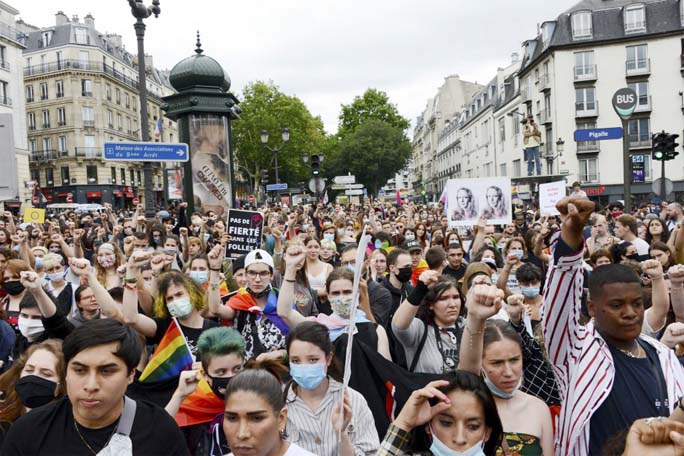
AP, Paris :
Paris police blocked anti-racism groups from leading a de-colonial tour of Paris on Sunday to call attention to monuments and streets honouring historical figures tied to the slave trade or colonial-era abuses.
Instead, the protesters marched around a monument in front of the French capital’s Museum of Immigration, waving signs with proposed new street names and symbolically renaming them with each circle.
A Paris police official said the organisers failed to declare their march route properly and so were held in place. The city has seen several protests in recent weeks against police brutality, racial injustice or economic injustice, and some have erupted in tensions. Sunday’s protest wrapped up peacefully.
Activist Ismael El Hajri said the goal of the event was to “avenge the insult of colonisation, and replace street names with heroes of fights for immigration and low-income neighbourhoods, people who stood up against colonisation”. While statues have fallen across the US and in some other European countries amid the global anti-racism movement following George Floyd’s death in Minneapolis on May 25, the response to such monuments in France so far has been more muted.
Scattered statues have been covered with graffiti, but French President Emmanuel Macron has insisted that authorities will not remove any controversial monuments, as has happened in other countries.
The most dominant and imposing racism is not visible, noisy and violent. Police violence is the end of the chain … before that, there is a bunch of work done through school, televisions, street names, building names to perpetuate racist views, said Franco Lollia of the Anti-Negrophobia Brigade. That’s why were here.
The event was organised by a group representing low-income neighborhoods in French suburbs that are home to large communities who trace their origins to former colonies. Black rights activists and migrants rights activists also joined.
They carried homemade street signs they had hoped to post on top of existing signs commemorating colonisers notably honouring minorities killed by French police.
We’ve closed our eyes for too long, said Loriane Lamer, a 20-year-old college student at the Paris protest. “Now, with the George Floyd movement and all, we can no longer close our eyes.” The event came the day after vandals defaced a mural in a Paris suburb honouring Floyd and Adama Traore, a French Black man who died in police custody.
Organisers held Sunday’s event to coincide with the 58th anniversary of Algerias independence from France after a long and brutal war. Algeria was considered the jewel in France’s colonial empire, and marked its independence day on Sunday with a special funeral ceremony for 24 resistance fighters decapitated by French forces in the 19th century.
The fighters skulls were brought back to France as trophies and held in a Paris museum for decades until their return to Algiers on Friday.
Paris police blocked anti-racism groups from leading a de-colonial tour of Paris on Sunday to call attention to monuments and streets honouring historical figures tied to the slave trade or colonial-era abuses.
Instead, the protesters marched around a monument in front of the French capital’s Museum of Immigration, waving signs with proposed new street names and symbolically renaming them with each circle.
A Paris police official said the organisers failed to declare their march route properly and so were held in place. The city has seen several protests in recent weeks against police brutality, racial injustice or economic injustice, and some have erupted in tensions. Sunday’s protest wrapped up peacefully.
Activist Ismael El Hajri said the goal of the event was to “avenge the insult of colonisation, and replace street names with heroes of fights for immigration and low-income neighbourhoods, people who stood up against colonisation”. While statues have fallen across the US and in some other European countries amid the global anti-racism movement following George Floyd’s death in Minneapolis on May 25, the response to such monuments in France so far has been more muted.
Scattered statues have been covered with graffiti, but French President Emmanuel Macron has insisted that authorities will not remove any controversial monuments, as has happened in other countries.
The most dominant and imposing racism is not visible, noisy and violent. Police violence is the end of the chain … before that, there is a bunch of work done through school, televisions, street names, building names to perpetuate racist views, said Franco Lollia of the Anti-Negrophobia Brigade. That’s why were here.
The event was organised by a group representing low-income neighborhoods in French suburbs that are home to large communities who trace their origins to former colonies. Black rights activists and migrants rights activists also joined.
They carried homemade street signs they had hoped to post on top of existing signs commemorating colonisers notably honouring minorities killed by French police.
We’ve closed our eyes for too long, said Loriane Lamer, a 20-year-old college student at the Paris protest. “Now, with the George Floyd movement and all, we can no longer close our eyes.” The event came the day after vandals defaced a mural in a Paris suburb honouring Floyd and Adama Traore, a French Black man who died in police custody.
Organisers held Sunday’s event to coincide with the 58th anniversary of Algerias independence from France after a long and brutal war. Algeria was considered the jewel in France’s colonial empire, and marked its independence day on Sunday with a special funeral ceremony for 24 resistance fighters decapitated by French forces in the 19th century.
The fighters skulls were brought back to France as trophies and held in a Paris museum for decades until their return to Algiers on Friday.

